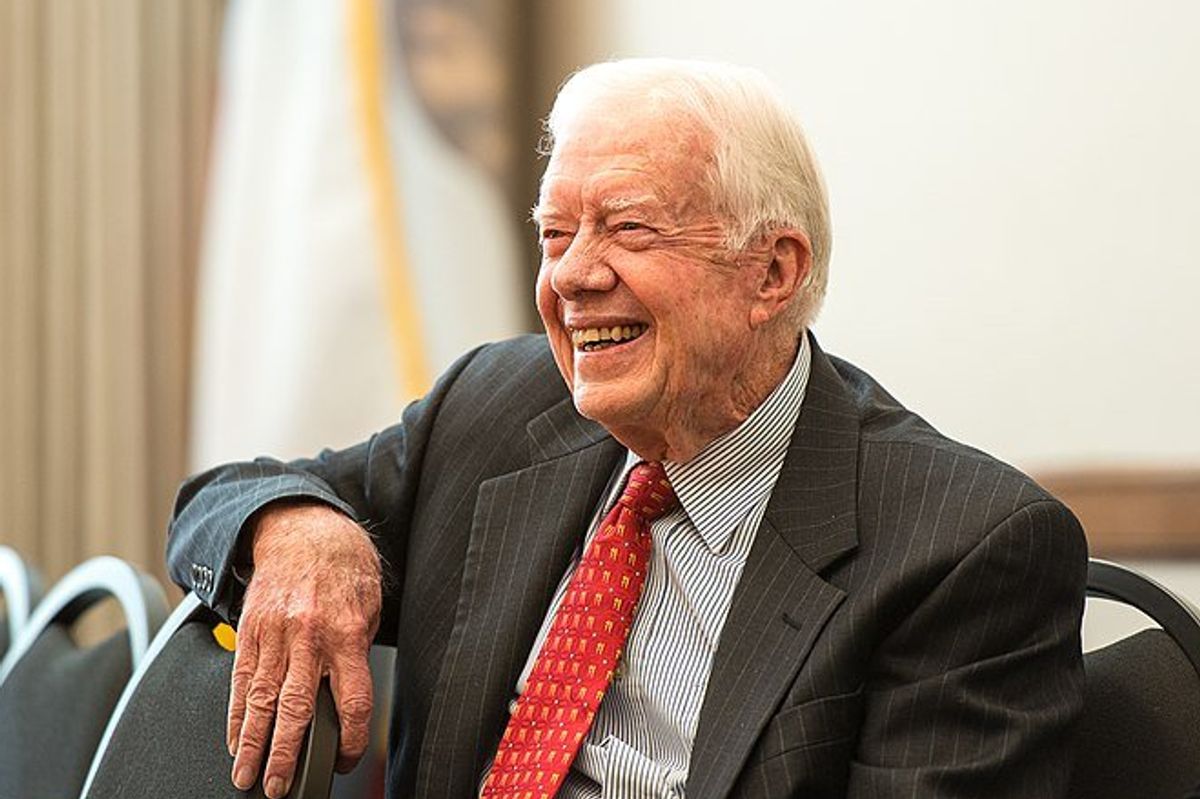Jimmy Carter has had many accomplishments, but nearly eradicating Guinea worm may be his greatest
It was a problem no one would touch.

Jimmy Carter at the Commonwealth Club in San Francisco, California
In 2015, former president Jimmy Carter held a press conference where he laid out a goal for the rest of his time on Earth. "I would like to see Guinea worm completely eradicated before I die," Carter said. "I'd like for the last Guinea worm to die before I do. I think right now, we have 11 cases. We started out with 3.6 million cases."
Now that Carter, 98, is in hospice, spending his final days at home with his family, he probably won’t achieve his goal. But his herculean efforts at abolishing the deadly worm will be ranked among his most significant achievements as a politician and humanitarian over his extraordinary life.
When the Carter Center took the lead on an international campaign to eradicate the Guinea worm in 1986, there were 3.5 million cases in 21 countries across Africa and Asia. In 2022, only 13 cases were reported worldwide, a 99.99% decrease. If the Guinea worm disease is completely eradicated, it would only be the second eradicated human disease in history, following smallpox.
Carter and his wife celebrated a record low in cases last year.
“Rosalynn and I are pleased with this continued advance toward eradicating Guinea worm disease,” President Carter said. “Our partners, especially those in the affected villages, work with us daily to rid the world of this scourge. We are heartened that eradication can be achieved soon.”
After Carter left the White House in 1981, he went on a mission to fight “neglected” diseases in far-off places that most Americans would never have to worry about. He set his sights on conditions such as lymphatic filariasis, trachoma, river blindness, and schistosomiasis.
His former drug czar Peter Borne brought Guinea worm to his attention. Borne approached the Carter Center because no one else would touch the problem.
Guinea worm is also known as dracunculiasis which means “affliction with little dragons” in Latin. About a year after infection, the worms grow to three feet long, and the females prepare to give birth by making their way to a place right below the skin, causing painful blisters.
Eventually, the blisters burst and the mother burrows her way out, causing incredible pain.
To ease the pain, people often submerge the affected area in water, causing tens of thousands of baby worms to release in the water, where they will eventually find a host. Guinea worm can also cause fever, swelling and secondary infections like sepsis. Guinea worm causes significant hardships for families by rendering people unable to work or attend school.
“It’s an audacious and mind-boggling idea,” said Emily Staub, press liaison to health programs for the Carter Center, according to CNN. “I’m not just talking about just him. I’m talking about a whole bunch of people with the Carter Center that decided that they were going to eradicate a disease that has no vaccine, no immunity, no medication. It’s thousands of years old and has a one-year incubation. The odds are totally stacked against you. And the people that suffer from it speak thousands of different languages, and some have never had outsiders interact with them.”

Jimmy Carter at the Commonwealth Club in San Francisco, California
But Carter persisted, creating countless partnerships with leaders around the globe to educate people about the worm, provide tools for clean water and prevent its spread in the animal population. "Guinea worm disease has no cure, no vaccination, basically the entire eradication effort is built on behavior change,” Kelly Callahan, a public health worker who partnered with the Carter Center, told NPR.
Thirty-seven years after the Carter Center started on the audacious task of eradicating Guinea worm, the WHO has certified that 200 countries are free of the disease, meaning they've had zero instances of transmission in three years. Only six countries have yet to be certified as disease-free.
Jimmy Carter set a nearly impossible task, but with dogged persistence and the ability to make partnerships with people worldwide, many of whom have had little contact with the outside, he has helped save millions upon millions of people from incredible suffering.
In the coming days, people will celebrate many of Carter’s accomplishments. Let’s be sure that no one forgets to mention a success he’d rank among his proudest.
“We were traveling in a big motorcade,” he said in 2017. “We were driving along, and elementary school children had a big sign that says, ‘Watch out, Guinea worm. Here comes Jimmy Carter.’ That was almost as good as a Nobel Prize for me.”
- Some timeless bits of wisdom from Jimmy Carter, now the longest-living president in U.S. history. ›
- Jimmy Carter built a solar farm in his hometown and it now powers half of the entire city ›
- Jimmy Carter is staying in for his 97th birthday. But here's how you can send him a message. ›
- Noel Casler shares a sweet story about Jimmy Carter on X - Upworthy ›
- Photo of Jimmy Carter goes viral - Upworthy ›



 A woman reading a book.via
A woman reading a book.via A woman tending to her garden.via
A woman tending to her garden.via

 Cats can be finicky about how they're held.
Cats can be finicky about how they're held.  Squish that cat.
Squish that cat. 

 A husband hands over his wedding ring to his soon-to-be ex-wife.via
A husband hands over his wedding ring to his soon-to-be ex-wife.via  A couple talks to a lawyer.via
A couple talks to a lawyer.via